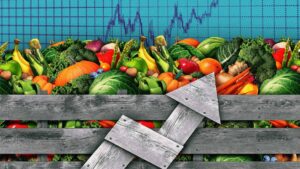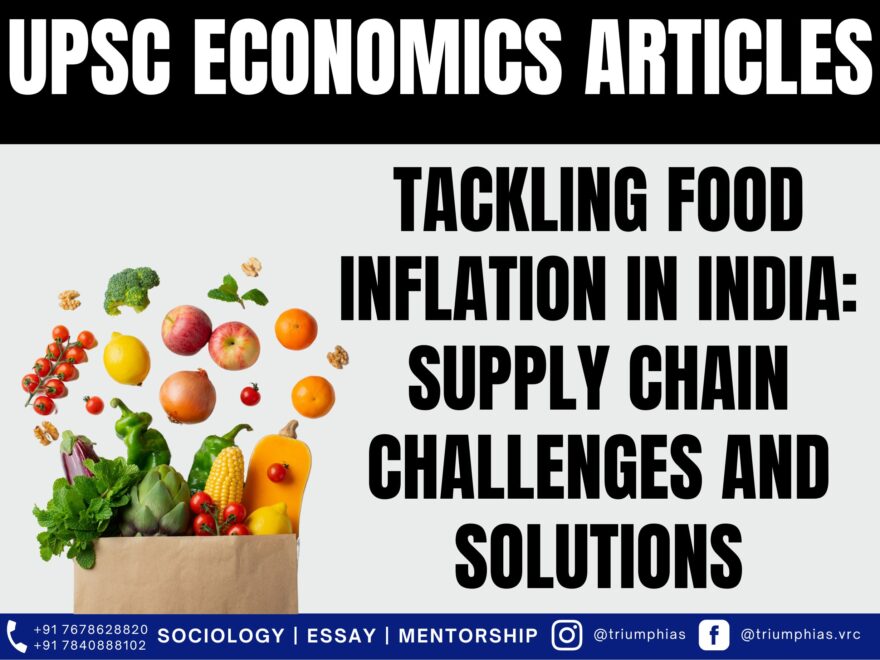Food Inflation
(Relevant for Economics Section of General Studies Paper Prelims/Mains)

Food inflation
Food inflation refers to the increase in the prices of food items over time. It affects the purchasing power and welfare of consumers, especially the poor and vulnerable sections of the society. The main causes of food inflation in India can be classified into demand-side and supply-side factors. On the supply side, one of the factors is the disruption of the supply chain.
Main reasons behind Supply Chain disruptions in India
- Fragmented Supply Chain: The extended and fragmented supply chain leads to wastage and escalating prices. This situation arises due to the significant presence of unorganized players within the supply chain, resulting in operational challenges related to commercial viability.
- Inadequate Cold Storage and Warehousing Facilities: Warehousing plays a crucial role in the overall supply chain; however, it is predominantly under the purview of unorganized entities. Presently, merely 20% of warehousing falls under organized structures, with the government controlling about 70% of this segment.
- Insufficient cold storage capacity contributes to post-harvest losses for perishable commodities like fruits, vegetables, dairy, and meat.
- Climatic Factors: Extreme temperature fluctuations and irregular rainfall patterns can adversely impact food grain production and yield.
- Global Influences: The global scenario also affects food inflation, with instances such as supply chain disruptions resulting from the COVID-19 pandemic, conflicts like the Russia-Ukraine war, and surges in international commodity prices. These elements have raised input costs and restricted the availability of essentials like edible oils, cereals, and sugar.
- Logistical Challenges: Logistics in India confront persistent challenges in terms of quality and connectivity. Despite Indian national highways handling around 40% of cargo despite accounting for only 2% of the total road network, quality and connectivity remain problematic. While port capacity is growing, the absence of proper connectivity to these ports leads to elevated costs and delays in cargo transfers.
Ways to address supply chain constraints
- Infrastructure Enhancement: It is imperative to invest in bolstering infrastructure elements like road connectivity, rail networks, power supply, and irrigation systems. These improvements are vital for ensuring the seamless movement of food commodities across different regions.
- Cold Storage and Warehousing Expansion: There is an essential requirement to increase the capacity of cold storage and warehousing facilities while maintaining their quality standards.
- Addressing Structural Challenges: India must actively pursue pending legislation aimed at resolving the lingering structural challenges (often referred to as the 4Ls: Land, Labour, Law, Liquidity) that continue to hinder domestic competitiveness and growth.
- Market Integration Promotion: The reduction of intermediaries and inefficiencies within the food supply chain can be achieved by encouraging direct connections between farmers and consumers. Measures such as fostering farmer producer organisations (FPOs), contract farming, and implementing e-NAM (electronic National Agriculture Market) can facilitate this integration.
- Climate Change Resilience Enhancement: Adopting climate-smart agricultural practices is crucial to empower farmers to cope with varying weather conditions and minimize crop losses. Techniques like crop diversification, utilization of improved seeds, water conservation, and effective soil health management can be integral in achieving this goal.
- Food Basket Diversification: To enhance the nutritional security of the population, there’s a need to diversify the dietary habits of Indians. This can be achieved by promoting the consumption of protein-rich and micronutrient-rich foods like milk, pulses, eggs, fruits, and vegetables. Such diversification can lead to reduced reliance on cereals and edible oils
Addressing the supply chain constraints causing food inflation in India requires a comprehensive approach. This includes investing in rural infrastructure, reducing post-harvest losses through improved storage and processing facilities, upgrading transportation systems, and enhancing market access for farmers. By implementing these measures, India can significantly improve its supply chain efficiency, reduce food wastage, and mitigate the impact of inflation on food prices.
To master these intricacies and fare well in the Sociology Optional Syllabus, aspiring sociologists might benefit from guidance by the Best Sociology Optional Teacher and participation in the Best Sociology Optional Coaching. These avenues provide comprehensive assistance, ensuring a solid understanding of sociology’s diverse methodologies and techniques.
Food Inflation, India, Supply Chain, Warehousing, Cold Storage, Climatic Factors, Global Influences, Logistical Challenges, Infrastructure, Market Integration, Climate-Smart Agriculture, Food Basket Diversification, Post-Harvest Losses, Government Policies, e-NAM, FPOs, Food Inflation, India, Supply Chain, Food Inflation, India, Supply Chain,
Choose The Best Sociology Optional Teacher for IAS Preparation?
At the beginning of the journey for Civil Services Examination preparation, many students face a pivotal decision – selecting their optional subject. Questions such as “which optional subject is the best?” and “which optional subject is the most scoring?” frequently come to mind. Choosing the right optional subject, like choosing the best sociology optional teacher, is a subjective yet vital step that requires a thoughtful decision based on facts. A misstep in this crucial decision can indeed prove disastrous.
Ever since the exam pattern was revamped in 2013, the UPSC has eliminated the need for a second optional subject. Now, candidates have to choose only one optional subject for the UPSC Mains, which has two papers of 250 marks each. One of the compelling choices for many has been the sociology optional. However, it’s strongly advised to decide on your optional subject for mains well ahead of time to get sufficient time to complete the syllabus. After all, most students score similarly in General Studies Papers; it’s the score in the optional subject & essay that contributes significantly to the final selection.
“A sound strategy does not rely solely on the popular
Opinion of toppers or famous YouTubers cum teachers.”
It requires understanding one’s ability, interest, and the relevance of the subject, not just for the exam but also for life in general. Hence, when selecting the best sociology teacher, one must consider the usefulness of sociology optional coaching in General Studies, Essay, and Personality Test.
The choice of the optional subject should be based on objective criteria, such as the nature, scope, and size of the syllabus, uniformity and stability in the question pattern, relevance of the syllabic content in daily life in society, and the availability of study material and guidance. For example, choosing the best sociology optional coaching can ensure access to top-quality study materials and experienced teachers. Always remember, the approach of the UPSC optional subject differs from your academic studies of subjects. Therefore, before settling for sociology optional, you need to analyze the syllabus, previous years’ pattern, subject requirements (be it ideal, visionary, numerical, conceptual theoretical), and your comfort level with the subject.
This decision marks a critical point in your UPSC – CSE journey, potentially determining your success in a career in IAS/Civil Services. Therefore, it’s crucial to choose wisely, whether it’s the optional subject or the best sociology optional teacher. Always base your decision on accurate facts, and never let your emotional biases guide your choices. After all, the search for the best sociology optional coaching is about finding the perfect fit for your unique academic needs and aspirations.
To master these intricacies and fare well in the Sociology Optional Syllabus, aspiring sociologists might benefit from guidance by the Best Sociology Optional Teacher and participation in the Best Sociology Optional Coaching. These avenues provide comprehensive assistance, ensuring a solid understanding of sociology’s diverse methodologies and techniques. Sociology, Social theory, Best Sociology Optional Teacher, Best Sociology Optional Coaching, Sociology Optional Syllabus.
Best Sociology Optional Teacher, Sociology Syllabus, Sociology Optional, Sociology Optional Coaching, Best Sociology Optional Coaching, Best Sociology Teacher, Sociology Course, Sociology Teacher, Sociology Foundation, Sociology Foundation Course, Sociology Optional UPSC, Sociology for IAS,
Follow us :
🔎 https://www.instagram.com/triumphias
🔎https://www.youtube.com/c/TriumphIAS
https://t.me/VikashRanjanSociology
Find More Blogs
|
Scope of the subject and comparison with other social sciences |
|||
|
|
|
|
Modernity and social changes in Europe |

